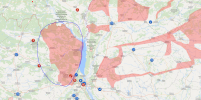Photos released by the ministry showed the top deck of the Nikolay Vilkov packed with at least 17 military trucks. All four ships also have internal holds capable of carrying various cargo or troops.
The Admiral Nevelskov and Peresvet were then detected by Japan on the morning of March 16, 220 kilometers northeast of Cape Shiryazaki.
The ships then proceeded through the narrow Tsugaru Strait, which separates Honshu from Japan’s northern main island of Hokkaido. The vessels were watched from the Japan Maritime Self-Defense Force’s destroyer JS Shiranui and P-3C maritime patrol aircraft.
Japanese media reported the ministry believes the ships were bringing additional units from Russia’s far east to shore up its forces involved in the invasion of Ukraine.
Ukraine’s Defence Ministry backed up this claim, saying March 18 that the Russian 155th Separate Naval Infantry Brigade, based in the port city of Vladivostok, and the 40th Separate Naval Infantry Brigade, out of Petropavlovsk-Kamchatsky, were heading west to “make up for the losses” suffered in Ukraine.
Both naval infantry units are assigned to the Russian military’s Eastern Military District.
The route taken by the Russian ships appears to suggest they were heading from Petropavlovsk-Kamchatsky in Russia’s Kamchakta Peninsula to Vladivostok, where they will most likely be loaded onto westbound trains if they are indeed bound for Ukraine.
Japan has designated the Tsugaru Strait an international waterway, allowing foreign ships to transit through it. The country claims territorial waters in the strait that extend 3 nautical miles from its coast, significantly less than the maximum of 12 nautical miles allowed under international law.

Japan spots Russian amphibious ships traveling between its islands
Four landing ship tanks, including one with its deck full of military trucks, were seen sailing in the Pacific Ocean westbound in the middle of last week, likely heading to Ukraine.


 jonka vuoksi voinkin kerrata päivitetyn ennusteeni sodan lopputulemasta:
jonka vuoksi voinkin kerrata päivitetyn ennusteeni sodan lopputulemasta:
 Motti!
Motti!

 .. yksi puolituttu kalankasvattaja väitti että sampi se ei osaa peruuttaa. Jos ei pysty kääntymään niin jää jumiin halkeamaan tsm. En sitten tiedä oliko ihan totta.
.. yksi puolituttu kalankasvattaja väitti että sampi se ei osaa peruuttaa. Jos ei pysty kääntymään niin jää jumiin halkeamaan tsm. En sitten tiedä oliko ihan totta.